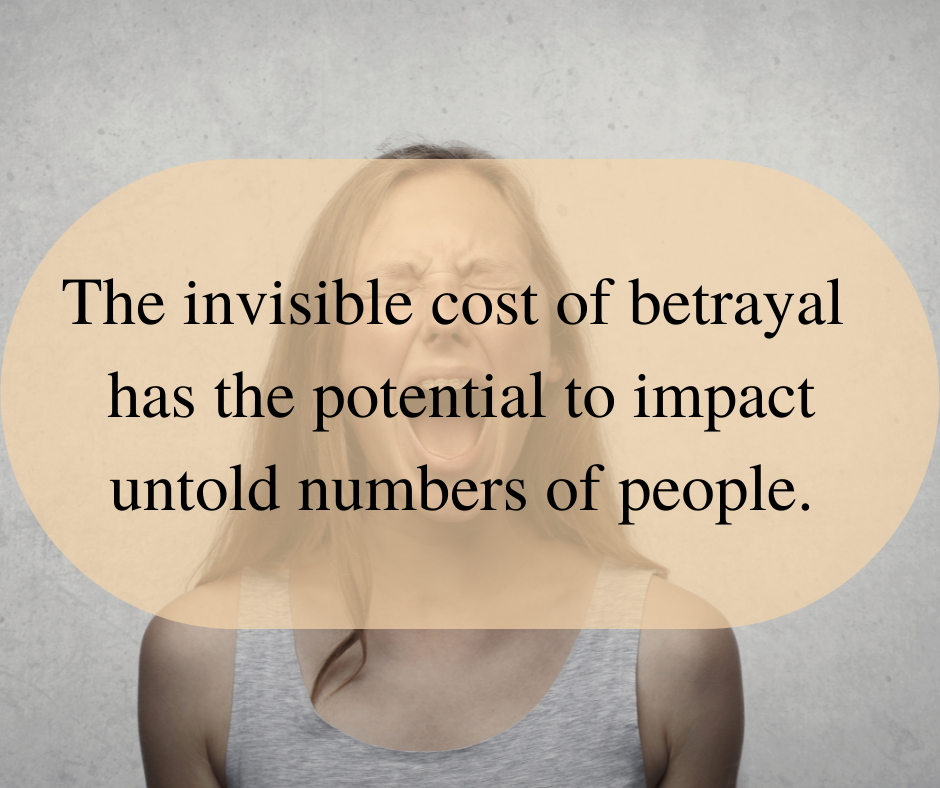Life-altering changes.
The effects of betrayal can include shock, loss and grief, morbid preoccupation, damaged self-esteem, self-doubting, and anger. Not infrequently, they produce life-altering changes.
No matter how strong we are, betrayal hurts; if not checked, it can paralyze us into depressive inertia, and at worst, into a perpetual state of bitterness and apathy. That is why it is important that we be careful how we handle hurt that emanates from betrayal, and if need be, to seek professional help wherever possible.
Betrayal trauma makes you feel like you are losing your mind. It puts you on an emotional rack and pulls you in opposite directions until you are begging for mercy. It yanks your sense of security out from under you and puts you in a state of emotional free fall.
Is being cheated on considered a trauma?
It is possible you could be experiencing post infidelity stress disorder (PISD), which is similar to the symptoms associated with post-traumatic stress disorder. After all, both conditions will involve trauma and a threat to your psychological and emotional security and wellbeing. A continual traumatic state can eventually lead you to physical damage as your immune system becomes impaired from constant stressors.
Here are 5 ways cheating and infidelity can affect your mental health:
- To many people, the instant reaction to infidelity is an immediate loss of self-esteem.
- Eating disorders, eating too much or not feeling hungry.
- Anxiety and depression, lacking motivation, not wanting to get out of bed in the morning.
- Loneliness and isolation, feeling unable to be sociable.
- Self-harm and suicidal thoughts, wanting the ground to open and swallow you up.
Cycle of abuse
Some abusive relationships follow a pattern. Abuse followed by remorse.
After causing harm, an abusive person may promise to change. To make up for their poor behaviour, they show kindness and romantic gestures.
This gives the abused person hope that their suffering will end and that they will one day receive the love or connection that the perpetrator has promised. The person experiencing the abuse may see suffering as a price to pay for their kindness.
Remorseful behaviour may also cause the abused person to feel grateful, particularly if they have become accustomed to poor treatment. The perpetrator may even tell you that you should be grateful that you have him or her in your life, This reinforces the bond.
A trauma bond develops under specific conditions. A person must:
- perceive a real threat of danger from their abuser
- experience harsh treatment with small periods of kindness
- be isolated from other people and their perspectives
- believe that they cannot escape
What is trauma bonding with a narcissist?
Trauma bonding is a psychological response to abuse. It occurs when the abused person forms an unhealthy bond with the person who abuses them. The person experiencing abuse may develop sympathy for the abusive person, which becomes reinforced by cycles of abuse, followed by remorse. The main sign that a person has bonded with an abuser is that they try to justify or defend the abuse.
- He is under a lot of pressure
- It is my fault — I make him angry
- He can’t help it, he’s frustrated
- He suffers a lot of physical pain due to ill health
Forgiveness. Can you forgive someone who betrayed you?
Forgiveness is the act of freeing yourself of the anguish and anger that you’ve felt towards the person who betrayed you. … If you do not forgive others after a betrayal, you will always in some sense remain tethered to the person who wronged you and won’t be able to live your own life to full capacity.
First, you will need to acknowledge the pain you feel from being wronged by a friend, partner, husband, or family member. The longer you’ve been in the friendship, the greater the likelihood that the hurt feels like a personal betrayal. You may think you’re incapable of forgiving this person, yet to hold on to the resentment and pain only plunges the ache deeper.
Why Forgive?
Forgiveness is one of the oldest spiritual practices on the planet.
Forgiveness can even lead to feelings of understanding, empathy and compassion for the one who hurt you. Practising forgiveness doesn’t mean forgetting or excusing the harm done to you or making up with the person who caused the harm. Forgiveness brings a kind of peace that helps you go on with life.
We have all had betrayals and disappointments in our lives that have caused us to block our ability to live a life we love living. I, myself, have had plenty of situations and people to forgive. Being betrayed, cheated and lied to, as my relationship ended abruptly, I was deeply hurt. I lost a lot of my self-respect, and also my self-esteem and my confidence suffered. I’ve had many people say unkind and hurtful things to me and about me.
I still believe in forgiveness despite the negative circumstances. To restore happiness and positivity in my life. I simply used the principles I learned from the various self-help and personal development courses and seminars I have attended. In practising forgiveness you could change your life. I’ve made the choice to forgive the beings involved in those situations – including myself. I know I can turn around and start to recover my confidence and self-esteem. Restart the online businesses that I had put on the back burner many times before. Now, I want to rebuild my life, recover my dreams, and possess unshakeable confidence in moving forward with my life…
I believe you have this potential, too!
Here are two Forgiveness meditations that I have created in video format.
Healing Starts with Knowing. “What Type of Man?” by a Survivor.
Get Your Copy Today. ★☆★Available on Amazon ★☆★



